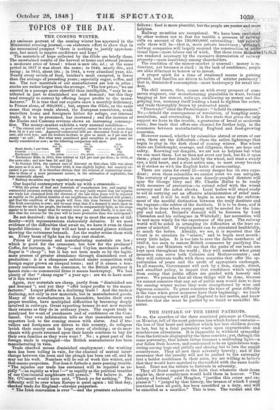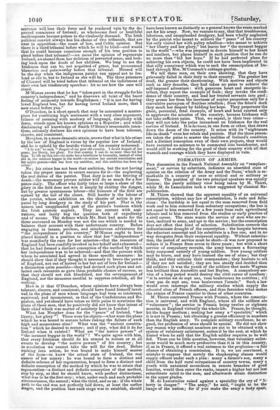THE MISTAKE OF THE IRISH PATRIOTS.
To us, the speeches of the three convicted prisoners at Clonmel, on Monday, tell of the most grievous loss which Ireland sustains— the loss of that heart and intellect which her best children devote to her, but by a fatal perversity waste upon impracticable and mischievous adventures. It is impossible to withhold sympathy from the fortitude displayed by the three convicts ; yet, through the same perversity, that heroic virtue becomes a misleading light—a star fallen from heaven, and condemned to be an ignisfatuus wan- dering among bogs and pitfalls and shining but to lure the stupid countryman. They all met their adversity bravely; and if the assurance that the penalty will not be pushed to the extremity lent a bolder confidence to their mien, we are willing to believe that they would have marched to the scaffold with the same hardi- hood. Stint not the tribute to fortitude in adversity.
They all found support in the faith that whatever their doom might be, their countrymen would hold them in honour. "The history of Ireland," said Meagher, "justifies this crime and ex- plains it " : "judged by that history, the treason of which I stand convicted loses all guilt, has been sanctified as a duty, and will be ennobled as a sacrifice." This is true. The verdict and the sentence will lose their force and be rendered vain by the de- praved conscience of Ireland; as wholesome food or healthful medicaments become poison to the virulently diseased. The Irish political convict always has his choice of two tribunals, that are ever in opposition—the court of law, and Celtic opinion. But there is a third tribunal before which he will be tried—and would that he could become conscious enough of his true position to plead before that tribunal !—we mean the opinion of regenerate Ireland, awakened from her delirium of perverted sense, and look- ing back upon the deeds of her children. We long to see the Irishman that can be, not acquitted of grace, but pronounced blameless and palmworthy before that tribunal. Blessed will be the day when the indigenous patriot can appeal not to Ire- land as she is, but to Ireland as she will be. The three prisoners of Clonmel will be tried before that tribunal on the indictment of their own last vindicatory speeches : let us see how the case will stand.
M‘Manus avows that he has "taken part in the struggle for his country's independence," and he disavows all taint of the baser feeling of animosity towards Englishmen : "it is not for having loved England less, but for having loved Ireland more, that I now stand before you."
O'Donohoe, in a short speech that may be accounted a master- piece for combining high sentiment with a very dose argument, fulness of meaning with modesty of language, simplicity with force, stands upon his known opinions as a Repealer ; and while disclaiming all knowledge of Smith O'Brien's treasonable inten- tions, solemnly declares his own opinions to have been tolerant, sincere, and consistent. Meagher, in a more dramatic strain, avows that what is his crime by the law of England is virtue by the popular law of Ireland; and he is upheld by the beatific vision of his country redeemed. "I do not," he said, " despair of my poor old country. I do not despair of her peace, her liberty, her glory. For that country I can do no more than bid her hope. To lift up this isle—to make her a benefactor to humanity, instead of what she is, the meanest beggar in the world—to restore her ancient constitution and her native powers—this has been my ambition, and this ambition has been my crime."
No; his crime has not been that ambition, but the not having taken the proper means to secure success for it—the neglecting the real duties of the patriot. That duty is not the braving of death—the mercenary private soldier will do as much for a few pence daily. The officer who fairly takes so large a share of the glory in the field does not win it simply by sharing the danger, but by greater spontaneous labour—the honours of the field are earned by the toil of the amt. Still harder is the labour of the patriot, whose exhibition on the theatre of action is pre- pared by long drudgery in the study of his part. That is the unseen and unapplauded part of the patriot's business which the Irish patriots neglect. They are content with aspi- rations, and lazily beg the question both of expediency and of means. The defence which Mr. Butt had made for the three sentenced on Monday was not the one which is needed to balance their account with their unfortunate country. Before engaging in insane, perilous, and mischievous adventures for "the independence of his country," M‘Manus ought to have placed himself in a position to show that her " independence " was manifestly the cure for her miseries—that the resources of England had been candidly invoked in her behalf and exhausted— that he had formed a distinct conception of the method by which her independence was to be achieved—and that the persons with whom he associated had agreed in those specific measures : he should show that if they thought it necessary to brave the power of England, not out of hatred to her but out of love for Ireland— a distinction quite possible—they had devised such plans and col- lected such resources as gave them probable chance of success, so that they should not risk bloodshed, nor the estrangement of England, nor the measures needful to suppress rebellion, all for nothing.
How is it that O'Donohoe, whose opinions have always been tolerant, sincere, and consistent, should have found himself invol- ved in the plans of men whose language had been so intolerant, equivocal, and inconsistent, as that of the Confederates and Re- pealers, and yet should have taken so little pains to scrutinize the plans of those men, that he positively did not know that intent of their chief which was matter of notoriety here in London ?
What has Meagher done for the "peace" of Ireland, "her liberty, her glory "? These were his objects—what were the plans which he was bound to mature before risking the failure of such high and momentous aims? What was the "ancient constitu- tion" which he desired to restore ; and if any, what did it do for Ireland when it existed ? What are "the native powers" of "the meanest beggar in the world " ? We quite agree with him, that every Irishman should do his utmost to restore or at all events to develop "the native powers" of his country ; but in revolution we -cannot take the will for the deed. Before rushing into action, he was bound to make himself master of the facts—to know the actual state of Ireland, the real causes of her misery : he was bound to form a distinct and definite scheme of her regeneration, bound to form a distinct and definite conception of the method by which he was to attain that regeneration—a distinct and definite conception of that method,
step by step, so that he should know, with perfect distinctness, what was to be the first step ; what, under such and such probable circumstances, the second ; what the third, and so on : if the whole path to the end was not perfectly laid down, at least the earlier stages, and the position that each stage was to establish, should have been known as distinctly as a general knows the route marked out for his army. Now, we venture to say, that that troublesome, laborious, and unapplauded drudgery, had been wholly neglected by the patriot who meant to achieve the " peace" of his country but only visited her with paltry rebellion—who meant to achieve "her liberty and her glory," but leaves her "the meanest beggar in the world"—who was prepared to devote himself to her heart and intellect, but places himself in such position that he can do no more than "bid her hope." If he had perfected plans for achieving his own objects, he could not have been implicated in that silly conspiracy which was to seek the emancipation of Ire- land through Mrs. M‘Cormack's cabbage-garden.
We tell these men, on their own showing, that they have grievously failed in their duty to their country. The greater her need, the greater their shortcoming. With motives and objects such as they describe, they had taken no pains to achieve the self-imposed adventure : with generous heart and energetic in- tellect, they repeat the example of fools ; they invoke the confi- dence of their country, and lead her trusted servants into gaol ; they arouse her from the inertness of supine pauperism only for a convulsive paroxysm of fruitless rebellion; from the felon's dock they mock her despair by bidding her hope. They perpetuate the great, perennial, fatal example, of heart and head exerted only to aggravate the miseries of the country, because Irishmen will not take sufficient pains. That, we repeat, is their true crime— they will not take the pains incumbent on Irishmen for the real service of Ireland. It is laziness, in one form or other, that draws down the doom of the country. It seizes with its "nightmare life-in-death" even her rebels and patriots. Had the three prison- ers taken the pains to master the realities of Ireland's condition and a distinct conception even of their own projects, they would have incurred no sentence to be commuted into banishment, and would still be working for the good of their country with all that warmth and courage which they have displayed in vain.



























 Previous page
Previous page